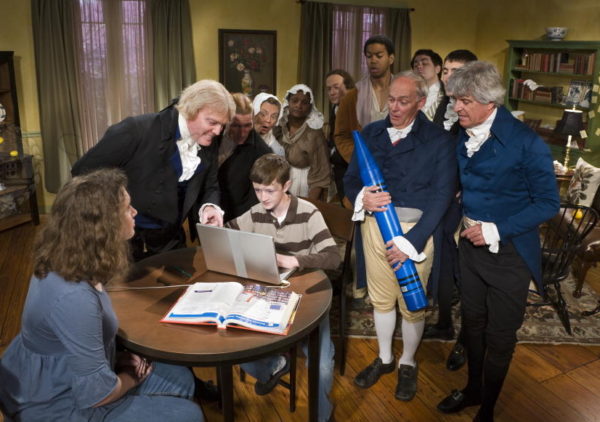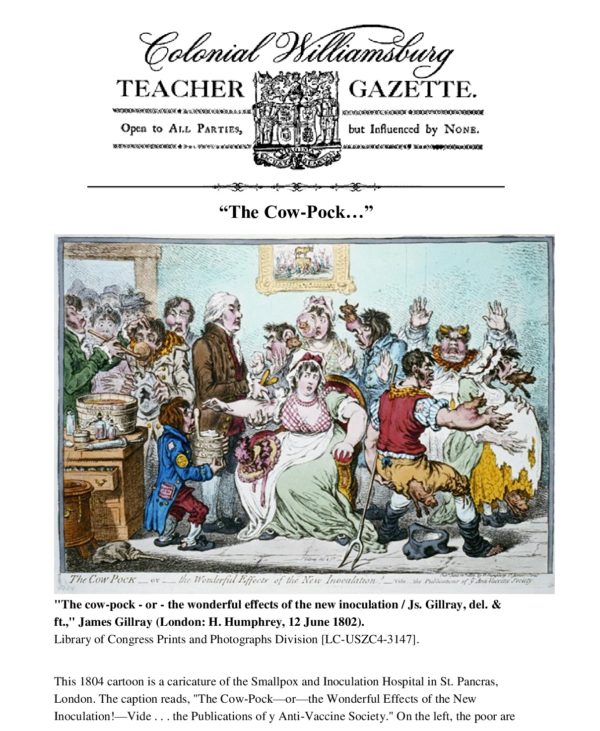
For years, people have been asking how they could see our amazing (and many-Emmy-award-winning) electronic field trips if they missed the television broadcast or weren’t a subscribing school. Beginning today, you can see 27, as well as hundreds of other educational resources. For free.
The Colonial Williamsburg Education Resource Library makes videos, primary sources, lesson plans, and more available to everyone. While our materials were created with classroom learning in mind, these resources offer the kind of well-researched and thought-provoking history from which any citizen can benefit.
If you’re curious about the past and like to discover new stories and ponder big questions, this is for you. If you have kids, this is for them, too. And if you want to tip off their teachers about it, well, thank you. They’ll benefit additionally from lesson plans and teaching ideas for every grade level.
Let me take you on a quick tour…
First, head over to resourcelibrary.history.org. You can create a free account there. If you’re not a teacher, just ignore the questions about your school and class size—they’re optional fields. (And rest assured, we won’t use your personal information other than to send you update emails if you opt in to them.)
After creating your account, you’ll see a main menu with a welcome message. Just below, under “My Resources,” you have the option to sort resources by title, era, subject, or theme. Title is simplest. Click on Video Programs and you’ll see thumbnails for all the electronic field trips loaded to this point. Right now, that’s 27. More of them, and more of all the resources, will be added monthly.
When you select a program, you’ll see there’s the main video, but also Web Activities and a Teacher Guide.
Start with the video. These are magnificently-told stories about who we are as a people and how we got here. Witness (with some snooping kids) the debates of the Constitutional Convention. Join Daniel Boone and his family in Westward! Be moved by the portrayal of the relationship of some of our founders and their slaves in Harsh World, This World (which is probably my favorite of all of them).
Most of the videos are divided into several episodes. Some tell a single story in several short pieces, others cover a theme from different angles. But these programs all have very high production values, which is another reason they collected 16 Emmy Awards over the years. The trailer for Women of the Revolution is below.
The Web Activities for each program are interactive games created for 4th-8th grade students. Some are more didactic, others lean more toward just being fun. But don’t be afraid of trying the games just because middle school is a distant memory. We had some fun making them. You’re bound to have some fun playing them. We promise not to tell.
The Teacher Guides have lesson plans to help teachers incorporate the programs into their classrooms, but you might enjoy checking out the primary source or even the program script.
OK, back to My Resources.
The second option under Title is for Additional Teacher Resources, which are divided into elementary, middle, and high school levels. All these resources link to pdfs, so you can print any of them as you wish. There are some great resources hiding in there (make your own three-cornered paper hat!), but they’re going to appeal most to teachers.

Now scroll down below the different grade levels to Primary Source Analysis. Here you’ll find some fun stuff, the pictures, cartoons, and documents that are the raw stuff of history. A 1780 letter from Thomas Jefferson seems straightforward enough, but do you know what a “cow-pock” refers to, or what a Portolan Chart is? You will. Colonial Williamsburg: dedicated to making you smarter.
Also, ice cream molds, which guides an analysis of an object from Colonial Williamsburg’s collections. And besides, who doesn’t want to eat ice cream that looks like asparagus. Seriously, just look at that picture.
So that’s the quick overview, but returning to the My Resources screen, there are a couple of other ways to slice and dice the resources. The second tab allows you to sort by era. If there’s a period you love, or you have an idea what you might be looking for, this is a pretty good way to make the list more manageable. Once you’ve selected an Era, the navigation works the same as under Video.
As I see it, there are two reasons to look at third tab, Subject. One is to be completely impressed by how we managed to apply the history here to subjects like science, math, and music. The second reason is if you know a kid (it couldn’t be you or you wouldn’t be reading this, right?) who just isn’t that into History, but maybe likes Science or Math.
By all means use this to introduce them to the Amazing Trade Shop Science Race (that’s the trailer for it above), or the Math sequel.
And no matter who you are, if you’re a living, breathing person, you should watch the zany and funny and wonderful Colonial Idol. That one, which may or may not bear a passing resemblance to certain television talent programs, features three alternate endings so we could air the winning one according to a live vote when it was broadcast. Now, you can have your own vote.
The fourth tab, Theme, offers a little bit more of a breakdown, with categories for African American, American Indian, Daily Life, and more.
Americans are part of an enduring debate—about who we are, and where we’re going. But it starts with where we’ve been, and we’re hoping these free resources will stimulate thoughtful conversation—and maybe even a little spirited debate—about that journey.

Christine Gifford says
I am so excited that you’ve made these available. We’ve been visiting CW since our children were toddlers,.
We have watched several of the videos, and since I work at a library, I’ve been able to tell several teachers about the resource. They were excited to have the resource available.. I sure wish I had this when we home schooled our kids.
Thanks a million!!!!
Thank you for offering this resource. It will be an excellent resource with the BJU curriculum for grade 1 and 2.
Karen Morrow says
Are the videos captioned for deaf and hard of hearing?
Karen,
Thanks for your question. At this point there are audio descriptions for people with a visual impairment, but we weren’t able to carry over the closed captioning from the broadcasts. That’s next on the list of improvements when funding becomes available. While we hope that will be sooner than later, there is no current timetable.
I do hope this can happen soon! 😊
This is fabulous news! I am not usually home to see the broadcasts, and I’m not a teacher, so I missed so man y of these productions. It will be wonderful to finally be able to take see them. I’ll also be able to let my brother know, so that my niece and nephew can learn more about American history. Thank you, CW!
Having just finished teaching a Osher Lifelong Learning Institute course to seniors (long-living ones, not high school) about 18th c world history based on the premise “the American revolution and its success was inevitable,” all the resources pertaining to the topic from HERO and others are the current favorites. But now we’ll be dipping our toes into other area, particularly 18th c trade and commerce, for the time being.
Huzzah! a hundred times for Colonial Williamsburg making the field trips available to all. We’ve been subscribers for a long time and know what a universe of information is held within its vaults. Welcome to all the newcomers. but be prepared to spend many amazing hours digging into the most brilliant and entertaining history lessons you’ve ever had. Thank you CW for opening the historic world even wider!
Thanks, and please spread the word! Monthly updates will keep making more resources available. So what’s your favorite?
What a marvelous new resource to help to breathe new life to our country’s past. The state that I teach in is in great financial difficulty. My inner-city school, one of the poorest performing in the state, lacks the money to provide our students with the enrichment resources and “hands-on” experiences that are needed. Thank you so much for helping to bring fun and excitement into a subject that many kids find irrelevant and boring.
Thank you-We hope teachers in cities like yours will find great use in these